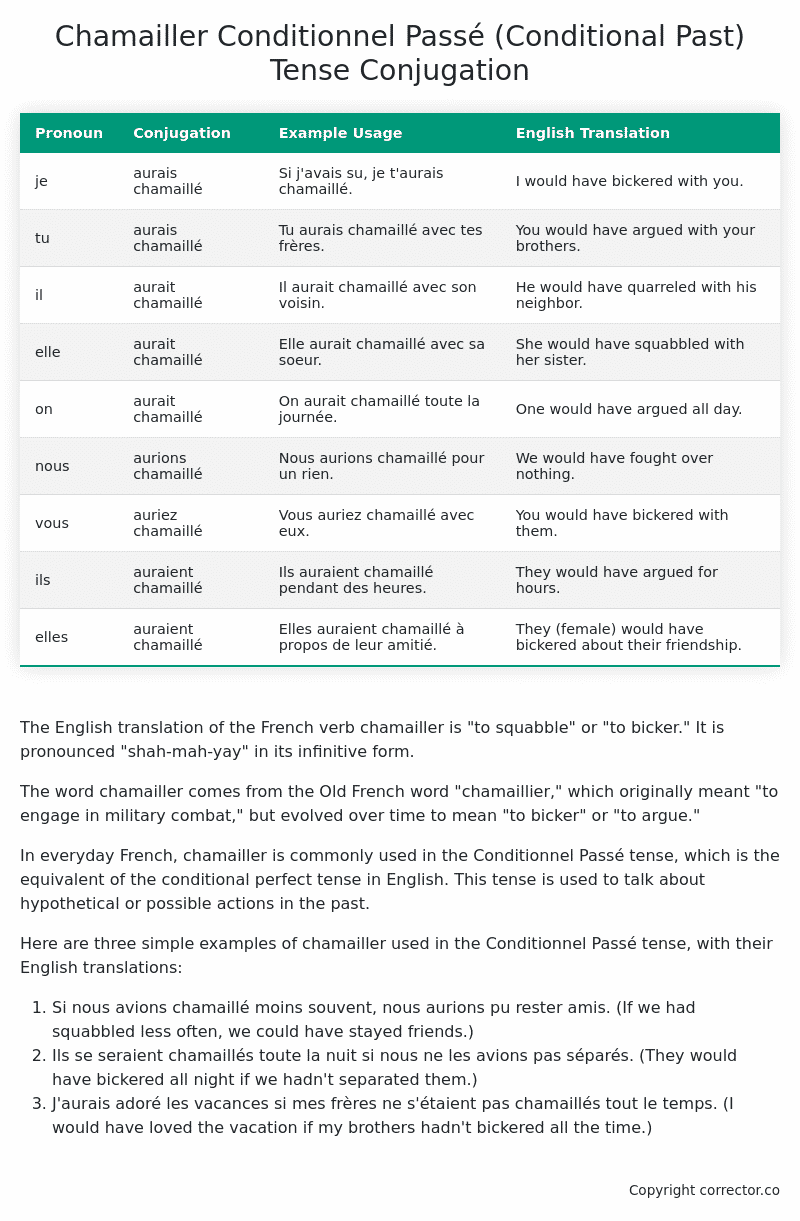Conditionnel Passé (Conditional Past) Tense Conjugation of the French Verb chamailler
Introduction to the verb chamailler
The English translation of the French verb chamailler is “to squabble” or “to bicker.” It is pronounced “shah-mah-yay” in its infinitive form.
The word chamailler comes from the Old French word “chamaillier,” which originally meant “to engage in military combat,” but evolved over time to mean “to bicker” or “to argue.”
In everyday French, chamailler is commonly used in the Conditionnel Passé tense, which is the equivalent of the conditional perfect tense in English. This tense is used to talk about hypothetical or possible actions in the past.
Here are three simple examples of chamailler used in the Conditionnel Passé tense, with their English translations:
- Si nous avions chamaillé moins souvent, nous aurions pu rester amis. (If we had squabbled less often, we could have stayed friends.)
- Ils se seraient chamaillés toute la nuit si nous ne les avions pas séparés. (They would have bickered all night if we hadn’t separated them.)
- J’aurais adoré les vacances si mes frères ne s’étaient pas chamaillés tout le temps. (I would have loved the vacation if my brothers hadn’t bickered all the time.)
Table of the Conditionnel Passé (Conditional Past) Tense Conjugation of chamailler
| Pronoun | Conjugation | Example Usage | English Translation |
|---|---|---|---|
| je | aurais chamaillé | Si j’avais su, je t’aurais chamaillé. | I would have bickered with you. |
| tu | aurais chamaillé | Tu aurais chamaillé avec tes frères. | You would have argued with your brothers. |
| il | aurait chamaillé | Il aurait chamaillé avec son voisin. | He would have quarreled with his neighbor. |
| elle | aurait chamaillé | Elle aurait chamaillé avec sa soeur. | She would have squabbled with her sister. |
| on | aurait chamaillé | On aurait chamaillé toute la journée. | One would have argued all day. |
| nous | aurions chamaillé | Nous aurions chamaillé pour un rien. | We would have fought over nothing. |
| vous | auriez chamaillé | Vous auriez chamaillé avec eux. | You would have bickered with them. |
| ils | auraient chamaillé | Ils auraient chamaillé pendant des heures. | They would have argued for hours. |
| elles | auraient chamaillé | Elles auraient chamaillé à propos de leur amitié. | They (female) would have bickered about their friendship. |
Other Conjugations for Chamailler.
Le Present (Present Tense) Conjugation of the French Verb chamailler
Imparfait (Imperfect) Tense Conjugation of the French Verb chamailler
Passé Simple (Simple Past) Tense Conjugation of the French Verb chamailler
Passé Composé (Present Perfect) Tense Conjugation of the French Verb chamailler
Futur Simple (Simple Future) Tense Conjugation of the French Verb chamailler
Futur Proche (Near Future) Tense Conjugation of the French Verb chamailler
Plus-que-parfait (Pluperfect) Tense Conjugation of the French Verb chamailler
Passé Antérieur (Past Anterior) Tense Conjugation of the French Verb chamailler
Futur Antérieur (Future Anterior) Tense Conjugation of the French Verb chamailler
Subjonctif Présent (Subjunctive Present) Tense Conjugation of the French Verb chamailler
Subjonctif Passé (Subjunctive Past) Tense Conjugation of the French Verb chamailler
Subjonctif Imparfait (Subjunctive Imperfect) Tense Conjugation of the French Verb chamailler
Subjonctif Plus-que-parfait (Subjunctive Pluperfect) Tense Conjugation of the French Verb chamailler
Conditionnel Présent (Conditional Present) Tense Conjugation of the French Verb chamailler
Conditionnel Passé (Conditional Past) Tense Conjugation of the French Verb chamailler (this article)
L’impératif Présent (Imperative Present) Tense Conjugation of the French Verb chamailler
L’infinitif Présent (Infinitive Present) Tense Conjugation of the French Verb chamailler
Struggling with French verbs or the language in general? Why not use our free French Grammar Checker – no registration required!
Get a FREE Download Study Sheet of this Conjugation 🔥
Simply right click the image below, click “save image” and get your free reference for the chamailler Conditionnel Passé tense conjugation!

Chamailler – About the French Conditionnel Passé (Conditional Past) Tense
Formation
Common Everyday Usage Patterns
Expressing Unreal Past Scenarios
Polite Requests or Suggestions
Expressing Doubt or Uncertainty
Interactions with Other Tenses
Conditional Present
Indicative Past Tenses
Conditional Future
Summary
Want More?
I hope you enjoyed this article on the verb chamailler. Still in a learning mood? Check out another TOTALLY random French verb conjugation!


